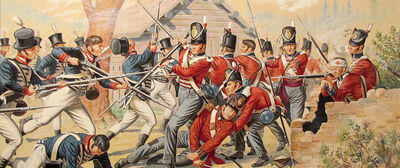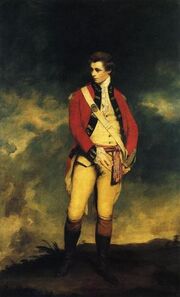
The War of 1812: The Canadian Theatre[]
"We are Hellhounds sent to escort the Americans to Sheol."
-Gordon Drummond, Commander of the British Army of Canada
The amount of British troops in Canada in 1812-13 was incredible. William had fallen hook-line-and-sinker for the trap and had left the British Motherland undermanned, all for the sake of defending glorious Canada from the Frogs and their nonexistent invasion. However, by late 1813, the Corsican Ogre was turning his territory-sensitive Roman schnoz to the snowy remnant and current bastion of British power. He basically threatened the Republican Union government into finally joining the Allies in a formal way and called for troops to help in the invasion of Canada and for military access to move through R.U. lands. The R.U., under Chief Consuls Oliver Wolcott, Jr., and Joseph Bloomfield, was very hesitant to get involved, mainly because it hated to ally with its southern neighbors for anything. When the Chief Consuls received a promise of new territory (the R.U. wanted to expand badly to compete with the South, but had no where to expand in before this), it sealed the deal.

First Chief Consul Joseph Bloomfield

Second Chief Consul Oliver Wolcott, Jr.
The British commander of the Army of Canada was Gordon Drummond, the first Canadian-born officer to command a British army. He tried to ship troops back to England when news began arriving of the disaster in Europe. Several thousand soldiers died when their transports were sunk by Danish sloops prowling the cold waters of the North Atlantic around Greenland. To top it off, the newly hostile R.U. had made a surprise attack into New Brunswick and Nova Scotia, while a small fleet from Europe barraged the Nova Scotian coast. The troops in Halifax and Fredericton, which formed about 15% of the British Army of Canada, were bottled up on both sides and were taking heavy casualties.
General Philip McDonald planned to bust out at Saint John and then march along the coast until he would come up behind American General Zebulon Pike's forces. After disabling Pike he was to march south, spreading terror and fear in the R.U. and try to burn as much of the country as possible.
Zebulon Pike was beaten, and beaten badly. McDonald requested that Drummond bring up every bit of soldiery Canada had in a full frontal assault on the Republican Union. McDonald stated that, "We are going to lose this war, Commander. We are going to lose no matter what. But damn my eyes if we aren't going to see the Republican Union burn before we're done. I ask you to join me on this attack, and like King Leonidas and the 300, we will march gallantly and with our heads held high to our own glorious demise."
Drummond responded to McDonald's request by saying, "Aye, I will come. We are Hellhounds sent to escort the Americans to Sheol. This is God's Work, McDonald. Kill all you find. Take no prisoners. Decimate them."

Gordon Drummond

Philip McDonald
The Republican Union called for immediate assistance from the other Allies. France was en route, but not in large enough numbers. Virginia was preparing, as was the Confederation of the Carolinas. But Georgia and West Florida, as well as Spain, seemed extremely slow in giving a darn about the hateful Union's fate, which was, in a way, a fair reaction, considering the R.U.'s attitude to its neighbors. And also in a way, they almost wanted to see the R.U. get taken down a notch. This decision and reluctance to help, though seemingly wise at the time, doomed the world to the future a horrible fate.
The beginning of the true dystopia was when McDonald plowed through the terrified militias in upper New England. One city after another burned. The British wanted nothing more than revenge and supplies to keep the fight going, not to add conquered territories to the defunct Empire. When Drummond joined in, cruising across the R.U.-Canadian border with no resistance, he had a few brief skirmishes with the Green Mountain Republic of Vermont before its government fled in terror southward. Leaving that small country to rot in its own failure, the Commander of Canada marched down to northern Massachusetts to join forces with McDonald. Together, they overwhelmed Zebulon Pike a second time, when Pike died fighting at Mt. Greylock (January, 1814). Canadian militias were still coming down from Northern New York, pillaging as they went, creating a trident formation of armies aiming to impale New York City. But currently, the Anglo-Canadians were laying to siege to Boston, the cradle of the hated American monsters' independence. The R.U. was collapsing, and the panic of losing everything was very real to most.

Republican troops march to their deaths at Mount Greylock
Bloomfield and Wolcott were furious at the seemingly deliberate lack of willpower from their "allies." President Madison of Virginia was finally sending in troops to put the Canadians down, and the Carolinians were marching to the call of battle, but it was clear by this point that the Republican Union would be virtually destroyed by Canada before the Allies came in and helped in full force.
Boston fell late March, without actually falling. Except for some brief scavenging, the Redcoats didn't actually occupy the city. Instead, they elected to burn as much as they could. Then, they packed up an marched to New York City.
Canadian manpower was running rather low at this point. Drummond and McDonald approached New York City in mid April. On April 22, several cannonballs crashed into the outskirts of the huge city. However, Virginia, Maryland, and CoCaro armies were fast approaching from the south, and the wrathful Canadians were forced to give up and trudge west, uniting with the militias that had been burning New York state itself, and together they trudged west, along the New York-Pennsylvania border. Then, in a surprise move, they jutted back southward into Pennsylvania itself. Following a brief campaign, the Canadians were defeated at Clarion, and from then on out Drummond and McDonald were on the retreat. The war was lost in the New World, and just barely continuing (equally hopelessly) in Britain itself. However, over 150,000 Republican Union men, women, and children had been killed during the Canadian Invasion, and a scar was left on North America that would only deepen as time went on, and is considered by many to be the beginning of the so-called "End Times Era." True horror would result from the actions of Gordon Drummond and Philip McDonald... horror beyond their wildest imagination.